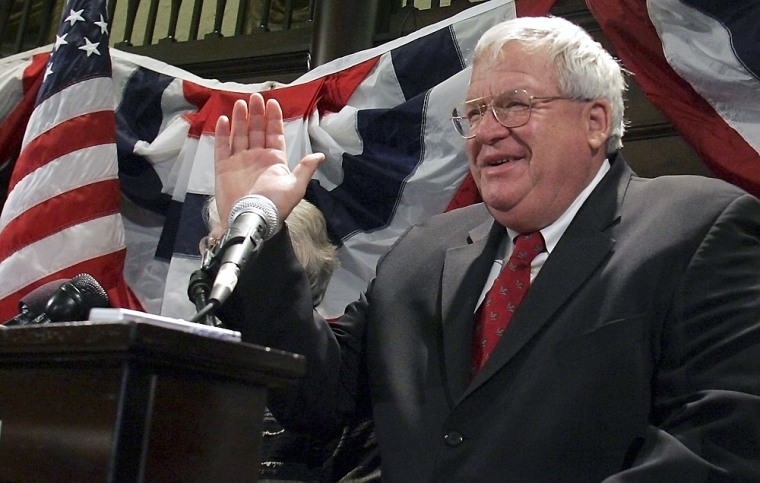Triggering a post-election shake-up, House Speaker Dennis Hastert announced Wednesday he will not run for leader of House Republicans when Democrats take control in January.
“Obviously I wish my party had won,” Hastert said in a statement, adding that he intends to return to the “full-time task” of representing his Illinois constituents.
Hastert first conveyed word of his plans in a conference call with fellow GOP leaders a day after Republicans lost control of the House in midterm elections.
His decision to step down cleared the way for a likely succession battle. Rep. John Boehner of Ohio, currently the majority leader, is expected to run for minority leader, and Rep. Mike Pence of Indiana announced during the day he also will seek the post. Joe Barton of Texas has signaled he might join the field.
Hastert was elected to an 11th term in Illinois on Tuesday night and had said he would seek a new term as speaker if the GOP held the House. But Democratic wins nationwide gave them control of the House and put California Democrat Nancy Pelosi in line to be the next speaker.
Hastert: ‘Tough out there’
“It’s been kind of tough out there,” Hastert said earlier during a brief appearance at his election headquarters.
In his statement, Hastert said Democrats “have a huge responsibility to help govern this nation” at a time of war against terrorism.
“We are at war, and what is at stake goes to the very nature of our democracy,” he said. “We can and should have a vigorous debate about how we conduct the war. But that debate must rest on a mutual understanding that our enemy is ruthless and seeks to destroy our way of life, and that we must ultimately be victorious in this battle.”
There is no recent precedent for Hastert's situation. The last time control of the House changed hands, in 1994, the speaker at the time, Democratic Rep. Tom Foley of Washington, lost his House seat.
Hastert, 64, became speaker nearly eight years ago, stepping up after Newt Gingrich resigned and his heir apparent, Bob Livingston, quit after saying he had had an extramarital affair.
A former high school wrestling coach, Hastert was the perfect tonic for Republicans at the time, studiously avoiding the controversy that Gingrich often seemed to court.
Hastert has been speaker since 1999, the longest-serving Republican speaker ever. In addition to the battering that his party took Tuesday, losing control of the House of Representatives after 12 years, his reputation had been scarred by the Rep. Mark Foley sex scandal.
The bipartisan House ethics committee is still probing whether Hastert, his staff, or other members of the Republican leadership knew about Foley’s inappropriate contact with teenage male pages. Hastert has denied any wrongdoing. Foley later resigned from the House.
Bush urged him to run again
Hastert worked closely with President Bush, and originally had indicated he would retire rather than seek re-election this fall. The president prevailed on him to run again though, and Hastert agreed.
Hastert’s tenacious — but plodding — approach to his tenure received mixed reviews. He largely shunned the talk-show circuit. Critics said he failed to line up GOP support for key legislation, including a 1999 resolution supporting U.S. intervention in Kosovo and gun-control measures.
Although conservative, Hastert became known more as a legislative tactician with a pragmatic, consensus-building style than as an ideological purist.
In an effort to keep his fragile, fractured Republican majority — and himself — in charge of the House, Hastert maintained a dizzying fundraising pace as speaker that rivaled the legendary cash-collecting abilities of his predecessor, Gingrich.
He took steps to decentralize the House, allowing policy to bubble up through the committees rather than being dictated down from the top.
Hastert won 10 terms by concentrating on issues important to his north central Illinois district, a mix of far-out Chicago suburbs, farmland and high-tech industry.
